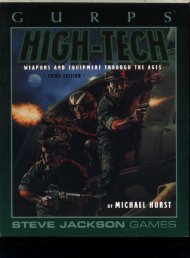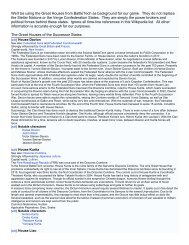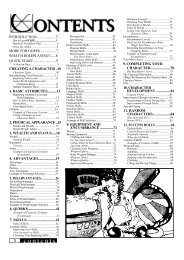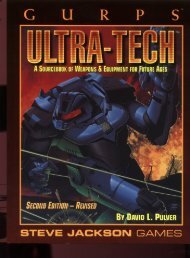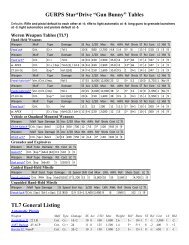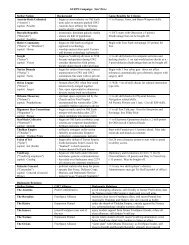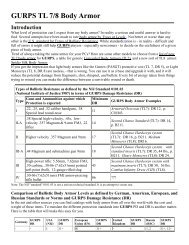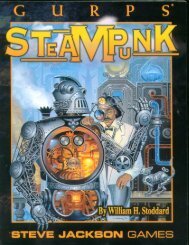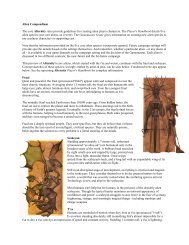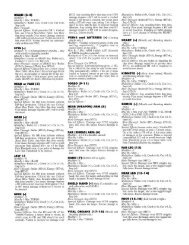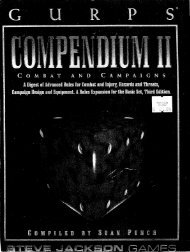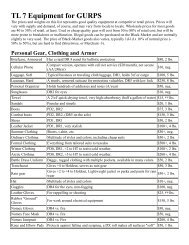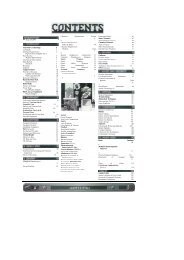GURPS - Compendium 1..
GURPS - Compendium 1..
GURPS - Compendium 1..
Create successful ePaper yourself
Turn your PDF publications into a flip-book with our unique Google optimized e-Paper software.
Familiar<br />
Variable<br />
Familiars are small animals or spirits which attend and serve a<br />
mage; the GM may allow any small creature to be a familiar.<br />
Otherworldly - or even "custom-designed" - creatures may be<br />
used at the GM's discretion. Unless extra intelligence is specified<br />
(see below), the familiar has normal stats for its type of animal.<br />
A magical familiar is an advantage, available only to those<br />
who have Magery 2 or 3. A mage may have only one familiar at a<br />
time. The familiar is an NPC, controlled by the GM. Most<br />
familiars will be obedient, but the GM should roleplay the animal's<br />
type; cats, in particular, may be aloof or stubborn, and<br />
monkeys are likely to be jokers! A familiar can develop an<br />
interesting personality and its own set of quirks.<br />
If a familiar dies, the mage earns no character points for that<br />
game session; if it is stolen, he must immediately try to recover<br />
it. In this way, familiars are like Dependents. A mage may summon<br />
a replacement for a lost familiar. If the new familiar is<br />
more powerful than the old one, the mage pays the point difference;<br />
if the new one is weaker, the mage doesn't get a "refund."<br />
The Nature of Familiars<br />
The GM determines which of the following sections are true.<br />
The point cost of a familiar depends on its abilities. If several<br />
abilities are possible, the familiar does not have to have them<br />
all. There are disadvantages and limitations which can reduce<br />
the point cost of a familiar, but a cost below 0 is treated as 0.<br />
Mages Can Draw Strength From Familiars: A mage can<br />
take ST (but not HT) from his familiar and use it to power his<br />
spells. The familiar must be in physical contact with the mage.<br />
The familiar's ST can be drained to 1 without ill effect. If it is<br />
drained to 0, the bond is broken and the familiar is lost, even if it<br />
doesn't die. The mage will always be aware of the current ST of<br />
his familiar when he touches it.<br />
Use the rules for Extra Fatigue (p. 55). The point cost of the<br />
familiar depends on the ST of the animal; for every point of ST it<br />
has, the mage receives a point of Extra Fatigue, at the usual<br />
cost of 3 points/level. This is why small familiars are much<br />
more common!<br />
The Mage Sees Through the Familiar's Eyes: The mage can<br />
perceive the world through the familiar's senses. Treat this as<br />
the Rider Within spell (p. M24), but usable only with the familiar.<br />
It requires three seconds to cast, and works automatically; its<br />
energy cost is 2 to cast, and none to maintain. Concentration is<br />
required to maintain contact with the familiar. Unless a limitation<br />
is specifically taken (see below), this works at any distance.<br />
This ability adds 5 points to the familiar's cost. If the familiar<br />
loses consciousness, the link is broken.<br />
The Familiar Gives the Mage Special Abilities: The mage<br />
gains one or more special abilities; often, these are abilities possessed<br />
by the animal, at the animal's skill level. If there is an<br />
appropriate advantage available to humans (e.g., Night Vision<br />
for a cat familiar), then the effect and cost is the same as if that<br />
advantage had been bought normally. If there is no such advantage,<br />
use the effects of the appropriate spell, but the mage need<br />
not worry about prerequisites!<br />
If the familiar dies, the extra abilities are lost instantly.<br />
The Mage Can Take His Familiar's Shape: Treat this as a<br />
modified version of the Shapeshifting spell (p. M25). Cost is 6 to<br />
cast, 1 to maintain. Point cost is assessed by the GM; from 5 to<br />
20, depending on the size and abilities of the familiar. If the<br />
familiar dies, the mage instantly returns to normal shape.<br />
The Familiar Is Intelligent: The familiar is smarter than any<br />
natural animal, and understands human speech. Cost: 5 points<br />
for IQ 7; 10 more points per level of IQ over 7. Thus, a familiar<br />
with IQ 10 (whatever its type) would cost 35 points.<br />
The Familiar Can Speak: This may be either mental communication<br />
(5 points), actual speech (10 points, and the familiar must also have<br />
IQ 7 or more), or both (15 points). Mental communication is treated<br />
as a modified Telepathy spell (p. M29), usable between mage and<br />
familiar only. Cost to cast is 1 each for mage and familiar; there is no<br />
cost to maintain, as long as both concentrate.<br />
Nine Lives: It is well known that cats have nine lives, of<br />
course. If a player wishes his character's familiar (cats only!) to<br />
have this ability, it adds 5 points to the cost of the familiar. The<br />
Nine Lives advantage lets the cat use the Super Luck rules (p.<br />
46) eight different times in its life before an opponent rolls to hit<br />
the cat or for damage to the cat, but at no other time.<br />
The Mage Suffers His Familiar's Wounds: If the familiar is<br />
wounded, the mage suffers the same number of hits. If the<br />
familiar is stunned or knocked unconscious, the mage must roll<br />
vs. HT or suffer the same effect. If the familiar dies, the mage is<br />
immediately reduced to -1 HT! This reduces the cost of the<br />
familiar by 15 points.<br />
Familiars Are Really Demons! The familiar is actually a demonic<br />
spirit - a creature of evil. It is working toward its own ends,<br />
and not the mage's. Whenever it is assigned a task, the GM rolls<br />
against its IQ. On a successful roll, it has found a way to pervert the<br />
mage's command. This often takes the form of misinformation;<br />
demons are notorious liars. The familiar also may pervert any spell<br />
that it helps to cast. Roll a quick Contest of IQ between mage and<br />
familiar; if the familiar wins, the GM makes the spell go wrong!<br />
The familiar may not cause direct harm to its master. Its aim is<br />
to sow disharmony and cultivate evil. If the mage is himself<br />
evil, the familiar will rarely if ever interfere with him! On the<br />
other hand, a truly "holy" person may not have a demonic familiar,<br />
and a person who successfully cultivates saintly virtue may<br />
eventually drive an evil familiar away (whether it belongs to<br />
him or someone close to him). A sufficiently holy person could<br />
banish a familiar like any other demon!<br />
The cost depends on the demon's IQ: -5 for IQ 7, -15 for IQ 8,<br />
-25 for IQ 9, -35 for IQ 10, instead of the usual point cost for<br />
enhanced IQ.<br />
Limitations on Familiars' Abilities<br />
When a familiar is designed, it may be given certain limitations<br />
which affect the point cost of its advantages (round fractional<br />
point costs up). All a familiar's advantages must take the<br />
same limitation, except for Demonic Familiar and Enhanced<br />
Intelligence, which cannot be limited, and ST Source, which<br />
cannot take the "Limited Range" limitation.<br />
Limited range: The familiar must be within 100 yards of the<br />
mage before its ability works. Halve the familiar's cost. This limitation<br />
cannot apply to the ST Source advantage, which requires touch.<br />
Limited time: The familiar's powers work only part of the<br />
time. Reduce its cost by the portion of the day in which its powers<br />
work. For instance, if the familiar's powers work only during the<br />
day (appropriate for a sun-mage!), halve their cost.<br />
Erratic powers: The familiar's powers come and go. Any<br />
time the mage tries to use one of these powers, the GM rolls 3<br />
dice to determine if the effect occurs. If the power fails, the<br />
mage must wait at least one minute before trying again. If the<br />
power works Occasionally (8 or less): 1/3 cost. Half the Time<br />
(10 or less): 1/2 cost. Quite Often (12 or less): 3/4 cost.<br />
37



